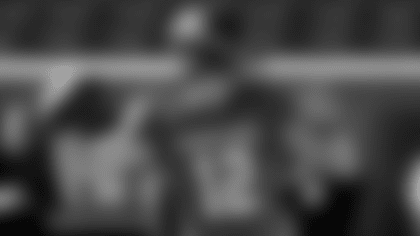Free agent choices like WR Joe Jurevicius, and the way he was used in 2003, have helped give Buc scouts an idea of the type of player Jon Gruden wants
There are draft-pick trades that, a year later, taste very sweet. And then there are draft-pick trades that, even a decade down the road, are still too bitter too swallow.
The Tampa Bay Buccaneers have sipped from both cups.
The mega-deal of last February that brought Jon Gruden to Tampa in exchange for two first-round picks (2002, 2003) and two second-round picks (2002, 2004) was just the elixir the eventual World Champions needed and will thus be remembered as a bargain. In contrast, the 1990 arrangement that shipped a first-round selection in 1992 to Indianapolis for QB Chris Chandler did nothing but leave the team with a headache.
Chandler started just six games as a Buccaneer, threw a total of five touchdowns and 14 interceptions, sparked several locker-room spats and was released outright before the end of 1991. Worse, the Bucs struggles in 1991 turned that traded pick into the second selection overall in '92.
Of course, the 2003 first-rounder traded to Oakland for Gruden is the last pick of the first round, as is always awarded to the Super Bowl victors.
"At one point this franchise surrendered a first-round pick and it was the second pick," said Bucs General Manager Rich McKay. "For a backup quarterback. So, yes, you're always happy to surrender a first and have it become the 32nd pick.
"There are teams, and we were one of them, who say, 'Don't ever trade future picks because you might be trading a top-five pick.' It's nice to be able to trade a future pick and it actually ended up being number 32."
The Bucs have easily made peace with the four picks they gave up to get Gruden. The issue now isn't with picks lost but with picks remaining, now that their new coach is in place. Buccaneer scouts have seven years of practice identifying the types of players to fit into the defensive scheme installed by Tony Dungy and Monte Kiffin in 1996. They're still learning what Gruden wants for his offense.
But they have a better feel for it in 2003 than they did a year ago.
"I think we do and I think that is normal," said Ruston Webster, the team's Director of College Scouting. "After you have been with a coach for a year you get a better feel for his likes and his dislikes. Hopefully, we will be able to get some good players because of that. But I think it definitely helps being around him for a year. The more you're around Monte and those defense guys, they know exactly what they want, the type of player they are looking for, what kind of skills he needs, what kind of guy he needs to be. From that standpoint, we are just getting there on offense."
In particular, the Bucs believe they have a stronger sense of what Gruden is looking for in an offensive lineman, and it's evidently not the same thing his predecessors wanted. On the other hand, the team did already have some receivers on hand that fit into Gruden's offense, and they quickly added several more in Joe Jurevicius and Keenan McCardell.
"From an offensive line perspective, we have an understanding and we've made some changes there based on that understanding," said McKay. "We said last year we were lucky in one sense in that getting Jon and having the West Coast (offense) in respect to the fact that it was a match with some of the receivers we had. Having Keyshawn (Johnson), specifically, then getting (Joe) Jurevicius. Yeah, I think we have an understanding of it."
On the other hand, the system for picking offensive players may never be as refined as the one the Bucs have formed on defense.
"We spend a lot of time talking about it," said McKay of the offensive tools Gruden needs. "But with offenses, it's a little different than defenses in that offenses change. Coaches modify their attack all the time, based on the talent they have. Defense is a little more, 'This is my scheme and I want guys to fit in it.' It's a little more defined. I've always found that offense, when you discuss it, is not as easily defined."
Gruden also has a different personality than Dungy, obviously, which might lead one to believe that the Bucs' drafts are more volatile these days. In fact, the team avoids any war room showdowns by coming to a consensus days before the draft, just as they did when Dungy was the head coach. Personalities aside, the Bucs want to give every coach a player about which he's excited.
"(Gruden and Dungy) are both very involved and both have major say in it," said Webster. "Like with any coach, we don't like to draft a guy they don't like, so whether it's Tony or Jon that's always going to be the case."
Added McKay: "Coaches are always going to be assertive to a point. You also want them to understand that, at the end of the day, scouts scout and coaches coach. You're still going to get the coaches to assert their position. You're just trying to do it in a way where you build a consensus, and when you walk away from it, everybody's satisfied. We had no problem doing that last year, we'll have no problem doing that this year.
"At the end of the day, the coaches are involved. These are their players. These are the guys they're going to coach, they're going to come in our locker room and they're going to be our players. To me, it is about us, and I think the process worked pretty well last year for us. It will work this year."
The draft-related adjustment to Gruden has been a two-way street. Under McKay, Tampa Bay has improved its draft fortunes in part by making better character assessments on potential draftees. The team employs what it calls a 'Buc Filter' to avoid repeating past mistakes.
"Jon had been exposed to a different side of it in Oakland, where their theory was, we'll control them when they get inside the house," said McKay. "Ours was a little different than that, specifically when we were building our football team. It was much different than that. But he understands it, and that doesn't mean that he's not going to take a different opinion and say, 'Let's consider this guy.' He did, and he will continue to, but he's good at understanding at the end of the day that when we make a decision, we're trying to make it looking at the total player and person combined.
"It doesn't mean the person's got to be Pollyanna. But it does mean that the person's got to love football, the person's got to be highly competitive, practice habits and football habits are going to be important and the person is going to buy into the fact that you're not going to embarrass us as a franchise. I think it was different for Jon, probably the emphasis we put on it was different, but I don't think it was a problem."






















